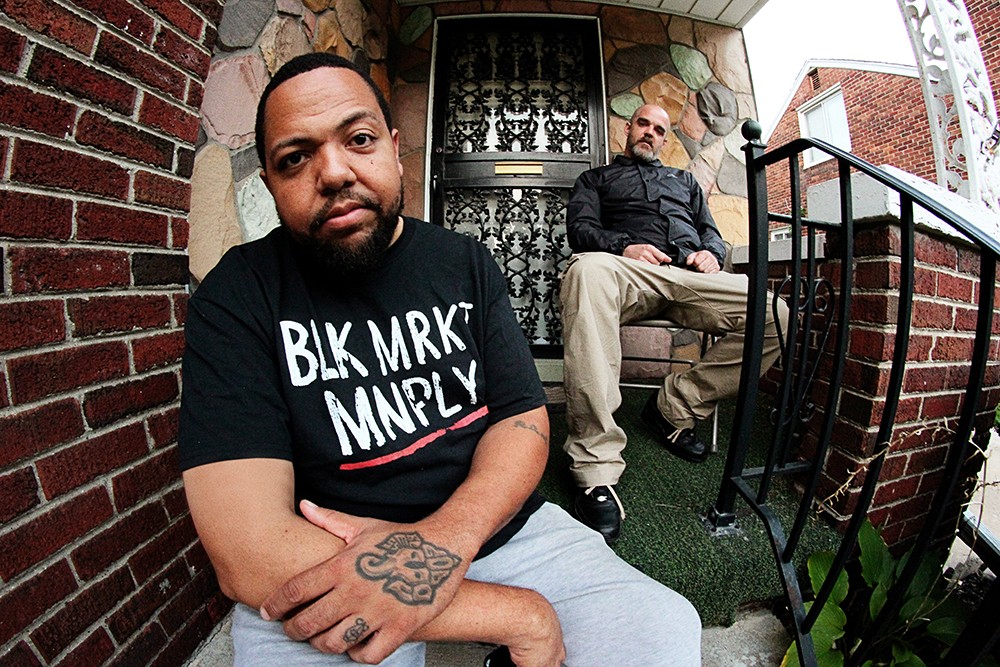Building a legacy is difficult, especially if that's all you're interested in doing. For rapper Big Tone and DJ-producer House Shoes, two longstanding stewards of Detroit hip-hop, it's never been about a legacy.
"When we were doing this shit 25 years ago, man, we weren't thinking about anything," says House Shoes. "We weren't thinking about history. We weren't thinking about legacy. We were fucking smoking weed and drinking alcohol. Partying at the club and making beats. Doing what we wanted to do. Through the innocence of that, we've got a major situation on our hands years later."
Having been part of hip-hop for almost three decades and counting, House Shoes and Big Tone are in a reflective place. They were tight with deceased legendary producer J Dilla, but their history now extends beyond that. They were dedicated attendees of open-mic nights at the Hip Hop Shop, but that spot is long gone. And even though the legendary 3-Floors-Of-Fun parties at Saint Andrew's Hall (which featured House Shoes on the 1's and 2's) defined a generation, those days are over. As important as it is to look back, Shoes and Tone have spent most of their careers looking forward. Until now.
On Friday, Tone and Shoes will drop Big Shoes, their first and likely only full-length project as a rapper-producer duo. Released via Shoes' Street Corner Music label (named for the storied record shop where Shoes worked in the '90s), Big Shoes is the result of a decades-long friendship that goes deeper than hip-hop. At 12 tracks, the album is a concise collection of stories from the point of view of two artists who have done their fair share of living. For Shoes, that's meant moving to Los Angeles more than a decade ago, building SCM, and DJing around the world. Tone, on the other hand, stayed in Detroit and has continued to be on the scene. For both, starting families and having kids was life-changing.
The first official Big Tone and House Shoes collaboration was on the song "Time" from Shoes' 2012 album, Let It Go. This is where the creation of the new album begins. "After we knocked that song out, Shoes sent me some more joints," recalls Tone. "I started writing to them, and we just kept that up for a couple months. I'd cut a few songs; he'd send me more beats. It just kind of turned into an album."
Detroit MCs bring a certain honesty, a particular sincerity, to their raps. It's the uncut truth, whether you want it or not. And on Big Shoes, Tone shows how powerful this is as he weaves between metaphor and real-life anecdotes. "I make decent money in the economically challenged place/ fulfilling the cost of livin' around my way/ plus the ground I lay was before my time/ Even for cats just around my age," he raps on the fifth song, "Fly Away." The second track, "High Velocity Pt. 1 & 2," uses in-your-face imagery of racing in a car to tell the story of life's daily grind. "Blast off/ check the flag in the distance/ but in my rear-view mirror I see someone taking position/ and silly me for thinking I had it in a land-slide/ but silly him for thinking I might allow him to pass by," Tone raps.
On the final song, "True Story," Tone riffs on coming up in the scene and navigating life. "When I first really started pursuing [hip-hop] we were selling music on cassette tapes," he recalls. "Seeing as how I haven't spoken too much about my place in Detroit rap, maybe this record can help people learn about all the things we've been a part of. I might not put out another record. If I'm going to take my rightful place in the books, then I gotta be the one to tell the story. I don't want to rely on anybody else to have to do that."
While not always thought of as a beat-maker, House Shoes has done his fair share of producing. On the album, the beats hit heavy and provide the perfect backdrop for Tone. This, however, might be the final time to hear Shoes' production. "This is the last of the Shoes beats," says Shoes. "I haven't made a beat since I had children. I'm not saying I'll never return to making beats, but who knows."
More than anything, Big Shoes is the story of a generation of Detroit hip-hop heads that came up in the '90s who changed the game with hard-hitting sample-based beats, a passion for playing records at the club, and high-powered lyricism. "It's a very incredibly human record," adds Shoes. "It's very spiritual. I'm not a religious person, but Tone brought that shit and I agree with all his points and perspective. We were always the nerds, man. Always the misfits. When we get a bunch of common minds together in a room, it's magic — it's love. It's amazing what you can build when you're not even trying to build something."
Stay on top of Detroit news and views. Sign up for our weekly issue newsletter delivered each Wednesday.


